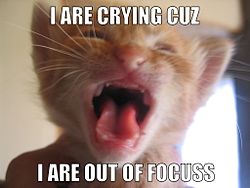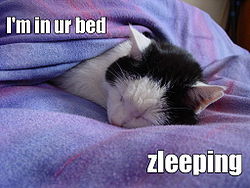Lolcat






A lolcat (pronounced /ˈlɒlkæt/ LOL-kat) is an image combining a photograph of a cat with text intended to contribute humour. The text is often idiosyncratic and grammatically incorrect, and its use in this way is known as "lolspeak" or "kitty pidgin".
"Lolcat" is a compound word of the acronymic abbreviation "LOL" and the word "cat".[1][2] A synonym for "lolcat" is cat macro, since the images are a type of image macro.[3] Lolcats are commonly designed for photo sharing imageboards and other Internet forums. Similar image macros which do not actually feature cats are often simply referred to as "lols".[4]
History
[edit]As early as the 1870s, British portrait photographer Harry Pointer created a carte de visite series featuring felines posed in various situations, to which he added amusing text intended to further enhance their appeal.[5]
However, the first recorded use of the term "lolcat" is from the anonymous imageboard, 4chan.[6][7][8] The word "Lolcat" is attested as early as June 2006, and the domain name "LOLcats.com" was registered on June 14, 2006.[9] Their popularity was spread through usage on forums such as Something Awful.[10] The News Journal states that "some trace the lolcats back to the site 4chan, which features bizarre cat pictures on Saturdays, or 'Caturdays'." Ikenburg adds that the images have been "slinking around the Internet for years under various labels, but they did not become a sensation until early 2007 with the advent of I Can Has Cheezburger?"[11] The first image on "I CAN HAZ CHEEZBURGER?" was posted on January 11, 2007, and was allegedly from the Something Awful website."[12][13] Lev Grossman of Time wrote that the oldest known example "probably dates to 2006,"[14] but later corrected himself in a blog post[15] where he recapitulated the anecdotal evidence readers had sent him, placing the origin of "Caturday" and many of the images now known by a few as "lolcats" in early 2005. The domain name "caturday.com" was registered on April 30, 2005.
The term lolcat gained national media attention in the United States when it was covered by Time,[16] which wrote that non-commercialized phenomena of the sort are increasingly rare, stating that lolcats have "a distinctly old-school, early 1990s, Usenet feel to [them]".
Entertainment Weekly put them on its end-of-the-decade, "best-of" list, saying, "Da cutest distractshun of da decaid? Y, lolcats of corse! We can neber haz enuf of deez capshioned pics of cuddlie kittehs."[17] 'Lolcat' was also a runner-up under the "Most Creative" category under the American Dialect Society Word of the Year Awards, losing out to 'Googlegänger'.[18]
Format
[edit]Lolcat is a composite of two words, "lol" and "cat". "Lol" stands for "Laugh out Loud" or "Laughing out Loud", hence lolcats are intended to be funny and to include jokes.[19] The lolcats images usually consist of a photo of a cat with a large caption characteristically set in a sans serif font such as Impact or Arial Black.[20] The image is, on occasion, digitally edited for effect. The caption generally acts as a speech balloon encompassing a comment from the cat, or as a description of the depicted scene. The caption is intentionally written with deviations from standard English spelling and grammar,[20] featuring "strangely-conjugated verbs, but a tendency to converge to a new set of rules in spelling and grammar".[20][21][22][not in citation given] The text parodies the grammar-poor patois stereotypically attributed to Internet slang. Frequently, lolcat captions take the form of phrasal templates.[22] Some phrases have a known source, usually a well-known Internet meme, such as All your base are belong to us or Do not want,[23] while others don't. The language of lolcats has also been likened to baby talk.[24]
Common themes include jokes of the form "Im in ur noun, verb-ing ur related noun."[25] Many lolcat images capture cats performing characteristically human actions or appearing to use modern technology, such as computers.
There are several well-known lolcat images and single-word captions that have spawned many variations and imitations, including "Ceiling Cat" (see below). Others include Fail (a cat with a slice of processed cheese on its face)[26] and "I Can Has Cheezburger" (a portrait of a blue British Shorthair).[27]
Offshoots and parodies
[edit]Variations on the lolcat concept include captioning photos of other animals in a similar style (e.g. loldogs for dogs, etc.).
The syntax of lolcat captions was used as the basis for LOLCODE, an esoteric programming language with interpreters and compilers available in .NET Framework, Perl, etc.[1]
Ceiling Cat and Basement Cat
[edit]"Ceiling Cat" is a character spawned by the meme. The original image was an image macro with a picture of a cat looking out of a hole in a ceiling, captioned "Ceiling Cat is watching you masturbate." [28] There followed numerous image macros with the format "Ceiling Cat is watching you [verb ending in/rhyming with -ate]" with Ceiling Cat superimposed in the upper left hand corner of an image macro depicting the appropriate action. The character is also featured in a project to translate the Bible to lolspeak. "Ceiling Cat" and the corresponding "Basement Cat" (a black cat who lives in the basement) represent good and evil (sometimes God and Satan) in the lolcat universe.[29][30][31]
See also
[edit]- Cats That Look Like Hitler - a type of LOLcat specifically made to look like Hitler
- Image macro
- Internet meme
- Laugh-Out-Loud Cats - a comic inspired by lolspeak and other Internet humor
- List of Internet phenomena
- LOLCat Bible Translation Project
- LOLCODE - an esoteric programming language inspired by lolspeak
- O RLY? - a related meme featuring image macros
- Oolong (rabbit) - A bunny trained to balance objects on its head. Famous for balancing pancakes and waffles, it has become a meme similar to Lolcats.
- Padonki - a Russian Internet subculture with slang similar in format to lolspeak
Notes
[edit]- ^ Jump up to: a b Dwight Silverman (2007-06-06). "Web photo phenomenon centers on felines, poor spelling". Houston Chronicle. Retrieved 2008-09-21.
- ^ Rutkoff, Aaron (2007-08-25). "With 'LOLcats' Internet Fad, Anyone Can Get In on the Joke". Wall Street Journal. Retrieved 2008-02-13.
- ^ Randy A. Salas (2007-06-09). "Laugh at cat humor". Akron Beacon Journal, Star Tribune.
At first, they were called cat macros, but now go mostly by the name lolcats.
{{cite news}}:|access-date=requires|url=(help) - ^ "LOL builder: Make your own lols"
- ^ "Harry Pointer's Brighton Cats"
- ^ Langton, Jerry (2007-09-22). "Funny how `stupid' site is addictive". The Star. Retrieved 2008-10-04.
{{cite web}}: External link in|publisher= - ^ "Iz not cats everywhere? Online trend spreads across campus".
- ^ smith, david. "the unseen face behind today's counterculture". Retrieved 2008-08-25.
- ^ WHOIS domain registration information results for lolcats.com from Network Solutions
- ^ Tom Whitwell (May 12, 2007). "Microtrends: LOLcats". The Times. Retrieved 2008-10-21.
{{cite web}}: Italic or bold markup not allowed in:|publisher=(help) - ^ "Lolcats' demented captions create a new Web language," Tamara Ikenberg, The News Journal, July 9, 2007
- ^ About « Lolcats ‘n’ Funny Pictures - I Can Has Cheezburger?
- ^ "Original Picture, cheezburger, ICANHASCHEEZBURGER, September 26, 2007 icanhascheezburger.com
- ^ Lev Grossman (2007-07-12). "Creating a Cute Cat Frenzy". Time (magazine). Retrieved 2007-07-16.
this has also spawned the digg dog which is part of the popular site titled digg.com
- ^ Lev Grossman (July 16, 2007). "Lolcats Addendum: Where I Got the Story Wrong". TIME. Retrieved February 15, 2010.
- ^ Grossman, Lev (2007-07-12). "Cashing in on Cute Cats". Time Magazine. Retrieved 2007-07-12. Partial scan of the print edition: fcrunk.wellimean.com
- ^ Geier, Thom, et al. (December 11, 2009). "The 100 Greatest Movies, TV shows, Albums, Books, Characters, Scenes, Episodes, Songs, Dresses, Music Videos, and Trends that entertained us over the past 10 Yuears". Entertainment Weekly. (1079/1080):74-84
- ^ Americandialect.org
- ^ retrothing.com. "1950's Proto-LOLcats".
- ^ Jump up to: a b c Anil Dash (2007-04-23). "Anil Dash: Cats Can Has Grammar". Retrieved 2007-05-03.
- ^ Annalee Newitz (2007-04-27). "I'M IN YR X Y-ING YOUR Z – A Grammar of Lolcats". Table of Malcontents, a Wired blog. Retrieved 2007-04-29.
These images... usually include a cute cat saying something related to buckets, cheeseburgers, or whatever else with strangely-conjugated verbs.
{{cite web}}: Italic or bold markup not allowed in:|publisher=(help) - ^ Jump up to: a b Mark Liberman (2007-04-25). "Language Log: Kitty Pidgin and asymmetrical tail-wags". Retrieved 2007-04-28.
- ^ "Top ten Star Wars myths and legends: Do not want". VirginMedia.com. Retrieved 2008-12-30.
- ^ Svensson, Peter (2008-04-24). "Lolcat site needz ur skillz". The Associated Press. Retrieved 2008-10-15.
- ^ Jay Cridlin (2007-06-01). "This be funny storyz". Tampa Bay Times.
- ^ Microtrends: Failure - Times Online
- ^ Tozzi, John (July 13, 2007). "Bloggers Bring in the Big Bucks". Business Week. Retrieved 2008-01-10.
{{cite journal}}: Cite journal requires|journal=(help); Italic or bold markup not allowed in:|publisher=(help) - ^ "Ceiling cat is watching you..." icanhazcheezburger.com. 2007-01-24. Retrieved 2009-08-17.
- ^ Amter, Charlie (2007-12-16). "Lolcat Bible Translation Project presents the Gospel according to Fluffy". Los Angeles Times. Archived from the original on 2007-12-24. Retrieved 2007-12-23.
{{cite news}}: Cite has empty unknown parameter:|coauthors=(help) - ^ Horan, Brianna. "How one hungry 'kitteh' can has the Internet lol". Retrieved 2008-06-18.
- ^ Guzman, Monica. "Time killer: The "lolcat" Bible". Retrieved 2008-06-18.
References
[edit]

- With 'LOLcats' Internet Fad, Anyone Can Get In on the Joke, Wall Street Journal, 25 August 2007
- If you give a cat a keyboard, Minneapolis Star Tribune, 26 July 2007
- Bloggers Bring in the Big Bucks, BusinessWeek, 13 July 2007
- Oh Hai! Cats, the internet, and tactical communities., Joshua Green in receiver magazine, Autumn 2007
- Agger, Michael (2007-05-21). "Cat power: You cannot resist lolcats". Slate Magazine. Retrieved 2007-05-21.
External links
[edit]Template:Side box Template:Side box
- REDIRECT Template:Internet dialects
- Pages using the JsonConfig extension
- CS1 errors: access-date without URL
- CS1 errors: external links
- CS1 errors: markup
- CS1 errors: missing periodical
- CS1 errors: empty unknown parameters
- Wikipedia pages with incorrect protection templates
- All articles with failed verification
- Articles with failed verification from April 2011
- Articles with invalid date parameter in template
- Spoken articles
- Articles with hAudio microformats
- Internet slang
- Internet memes
- Web humor
- Photography by genre
- Cats in popular culture
